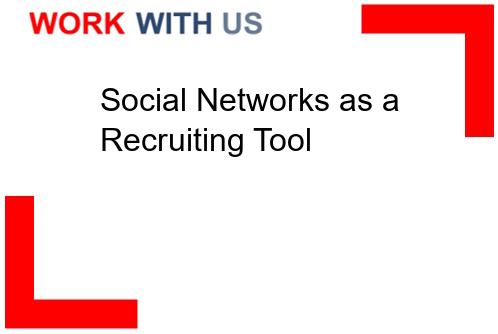Social networks have revolutionized the way people connect and interact with each other, and their impact extends far beyond personal relationships. In recent years, social networks have emerged as a powerful tool for recruitment, enabling companies to tap into a vast pool of talent and connect with potential candidates in a more personalized and efficient manner. With their ability to reach a wide audience and provide valuable insights into candidates’ backgrounds and interests, social networks have become an indispensable resource for recruiters.
One of the key advantages of using social networks as a recruiting tool is the ability to access a diverse talent pool. Platforms such as LinkedIn, Facebook, and Twitter have millions of active users from various professional backgrounds, making it easier for recruiters to find candidates with specific skills and experiences. By leveraging the search and filtering capabilities of these platforms, recruiters can narrow down their search to individuals who possess the desired qualifications, saving time and effort in the recruitment process.
Moreover, social networks provide recruiters with a wealth of information about potential candidates. Profiles on platforms like LinkedIn often include detailed resumes, work experience, and endorsements from colleagues, providing recruiters with a comprehensive overview of a candidate’s professional background. This allows recruiters to assess a candidate’s suitability for a role more effectively and make informed decisions about whether to pursue further engagement.
In addition to the information provided on profiles, social networks also offer valuable insights into candidates’ interests, hobbies, and online activities. This information can be crucial in determining cultural fit within an organization and identifying candidates who align with the company’s values and mission. By analyzing a candidate’s social media presence, recruiters can gain a deeper understanding of their personality, communication style, and potential cultural contributions to the team.
Furthermore, social networks enable recruiters to engage with potential candidates in a more personalized and interactive manner. Through direct messaging, recruiters can initiate conversations with candidates, providing an opportunity to establish a rapport and gauge their interest in a particular role. This direct communication also allows recruiters to address any questions or concerns candidates may have, fostering a positive candidate experience and increasing the likelihood of successful recruitment.
Social networks also facilitate the sharing of job opportunities within professional networks. When recruiters post job openings on social platforms, they can be easily shared and circulated among connections, increasing the reach and visibility of the job posting. This viral effect can attract passive candidates who may not actively be seeking new opportunities but are open to exploring them if presented with the right offer.
In conclusion, social networks have emerged as a valuable tool for recruiters, offering access to a diverse talent pool, providing comprehensive candidate information, enabling personalized engagement, and facilitating the sharing of job opportunities. As the influence of social networks continues to grow, recruiters must adapt their strategies to leverage these platforms effectively and stay ahead in the competitive talent acquisition landscape. By harnessing the power of social networks, recruiters can enhance their recruitment efforts, connect with top talent, and ultimately build high-performing teams.
The impact of social networks on the recruitment process: a comprehensive analysis
In today’s digital age, social networks have revolutionized the way people connect and interact with each other. Beyond personal use, these platforms have also made a significant impact on various aspects of professional life, including the recruitment process. This comprehensive analysis aims to delve into the profound influence of social networks on recruitment, exploring both the advantages and challenges they present.
One of the most evident advantages of social networks in the recruitment process is the ability to reach a vast pool of potential candidates. With billions of active users across different platforms, recruiters can tap into a diverse talent pool that was previously inaccessible. This expanded reach allows organizations to cast a wider net and attract candidates from different backgrounds, experiences, and geographical locations.
Moreover, social networks provide recruiters with valuable insights into candidates’ professional profiles and activities. Platforms like LinkedIn allow individuals to showcase their skills, experiences, and recommendations, providing recruiters with a comprehensive overview of a candidate’s qualifications. This wealth of information enables recruiters to make more informed decisions and identify candidates who align with the organization’s requirements.
Additionally, social networks facilitate direct communication between recruiters and candidates. Through messaging features or comments on posts, recruiters can engage with potential candidates, fostering a more personalized and interactive recruitment experience. This direct interaction allows recruiters to gauge a candidate’s communication skills, professionalism, and cultural fit, which are crucial factors in the hiring process.
Furthermore, social networks have transformed the way organizations promote job opportunities. Instead of relying solely on traditional job boards or advertisements, recruiters can leverage social media platforms to create engaging and visually appealing job postings. By incorporating multimedia elements such as videos or infographics, recruiters can attract candidates’ attention and effectively communicate the organization’s values and culture.
Despite the numerous advantages, social networks also present challenges in the recruitment process. One of the primary concerns is the authenticity and accuracy of information provided by candidates on their profiles. While social networks offer a wealth of information, there is a risk of candidates embellishing their qualifications or misrepresenting their experiences. Recruiters must exercise caution and verify the information provided through thorough background checks and interviews.
Moreover, the sheer volume of applications received through social networks can be overwhelming for recruiters. Sorting through a large number of profiles and resumes can be time-consuming and may lead to potential candidates being overlooked. To address this challenge, organizations can utilize applicant tracking systems or employ dedicated recruitment teams to streamline the process and ensure a fair evaluation of all candidates.
Another challenge is the potential for unconscious bias in the recruitment process. Social networks may inadvertently expose recruiters to personal information about candidates, such as their age, gender, or ethnicity, which can influence decision-making. Organizations must implement robust diversity and inclusion policies and provide training to recruiters to mitigate the impact of unconscious bias and ensure fair and equitable hiring practices.
In conclusion, social networks have had a profound impact on the recruitment process, offering both advantages and challenges. The ability to reach a vast talent pool, access comprehensive candidate profiles, and facilitate direct communication are significant benefits. However, concerns regarding the authenticity of information, the volume of applications, and the potential for unconscious bias must be addressed. By leveraging the advantages and implementing strategies to mitigate challenges, organizations can harness the power of social networks to enhance their recruitment processes and attract top talent.
Leveraging social networks for effective talent acquisition strategies
s become increasingly important in today’s digital age. With the rise of platforms such as LinkedIn, Facebook, and Twitter, recruiters and HR professionals have a wealth of opportunities to connect with potential candidates and build relationships with them. By utilizing social networks, organizations can tap into a vast pool of talent, enhance their employer brand, and streamline their recruitment processes.
Building a Strong Employer Brand
One of the key benefits of leveraging social networks for talent acquisition is the ability to build a strong employer brand. Social media platforms provide organizations with a unique opportunity to showcase their company culture, values, and employee experiences. By sharing engaging content, such as employee testimonials, behind-the-scenes glimpses, and success stories, companies can attract top talent who resonate with their brand.
Expanding Reach and Access to Passive Candidates
Social networks offer a vast reach and access to both active and passive candidates. While active candidates actively search for job opportunities, passive candidates are not actively looking but may be open to new opportunities. By leveraging social networks, recruiters can tap into this passive talent pool and engage with potential candidates who may not have otherwise considered a career change. This expands the organization’s reach and increases the chances of finding the best-fit candidates for their roles.
Engaging with Candidates in a Personalized Manner
Social networks provide a platform for recruiters to engage with candidates in a more personalized manner. Through direct messaging, comments, and likes, recruiters can establish a rapport with potential candidates and create a positive candidate experience. This personalized approach helps to build trust and fosters a sense of connection, making candidates more likely to consider opportunities with the organization.
Leveraging Employee Advocacy
Employee advocacy plays a crucial role in talent acquisition strategies. By encouraging employees to share job postings and company updates on their personal social networks, organizations can tap into their employees’ networks and reach a wider audience. Employee advocacy not only increases the visibility of job openings but also enhances the organization’s credibility and authenticity. Candidates are more likely to trust and consider opportunities shared by employees rather than traditional job postings.
Leveraging Data and Analytics
Social networks provide valuable data and analytics that can be leveraged to optimize talent acquisition strategies. By analyzing engagement metrics, such as likes, comments, and shares, recruiters can gain insights into the effectiveness of their content and adjust their approach accordingly. Additionally, social media platforms often provide demographic and interest-based targeting options, allowing recruiters to reach specific candidate segments and tailor their messaging accordingly.
The Future of Social Recruiting
As technology continues to evolve, so does the landscape of social recruiting. Emerging trends such as artificial intelligence (AI) and machine learning are revolutionizing talent acquisition strategies. AI-powered chatbots can engage with candidates, answer their queries, and even conduct initial screening interviews. Machine learning algorithms can analyze vast amounts of data to identify patterns and predict candidate suitability for specific roles. These advancements not only streamline the recruitment process but also enhance the candidate experience.
In conclusion, is essential in today’s competitive job market. By building a strong employer brand, expanding reach to passive candidates, engaging with candidates in a personalized manner, leveraging employee advocacy, and utilizing data and analytics, organizations can optimize their recruitment efforts and attract top talent. As technology continues to advance, the future of social recruiting holds even more exciting possibilities for organizations to connect with candidates and find the perfect fit for their teams.
Exploring the role of social networks in employer branding and recruitment
Social networks have become an integral part of our daily lives, revolutionizing the way we communicate, share information, and connect with others. In recent years, these platforms have also emerged as powerful tools for employer branding and recruitment. Companies are increasingly recognizing the potential of social networks in attracting top talent and shaping their brand image.
One of the key roles of social networks in employer branding is the ability to showcase a company’s culture and values. Through engaging content and interactive posts, organizations can provide a glimpse into their work environment, employee experiences, and company ethos. By sharing stories of employee success, team-building activities, and community involvement, companies can create a positive and authentic brand image that resonates with potential candidates.
Moreover, social networks offer a unique opportunity for companies to engage with their target audience on a more personal level. By actively participating in conversations, responding to comments, and addressing concerns, organizations can build trust and establish themselves as approachable and transparent employers. This level of engagement not only enhances the employer brand but also helps in attracting top talent who value open communication and a supportive work environment.
In addition to employer branding, social networks have also revolutionized the recruitment process. Platforms like LinkedIn, Facebook, and Twitter have become popular channels for job postings, reaching a vast pool of potential candidates. Companies can leverage the power of social networks to target specific demographics, industries, or skill sets, ensuring that their job openings reach the right audience.
Furthermore, social networks enable companies to tap into the passive job market. Many professionals who are not actively seeking new opportunities may still be open to exploring exciting career prospects. By showcasing their employer brand and job opportunities on social networks, companies can capture the attention of these passive candidates and entice them to consider a career change.
Another significant advantage of social networks in recruitment is the ability to leverage employee networks for referrals. Research has shown that employee referrals often result in higher-quality hires and better retention rates. Social networks provide a platform for employees to share job openings with their connections, expanding the reach of recruitment efforts and tapping into a trusted network of potential candidates.
Moreover, social networks offer valuable insights and data that can inform recruitment strategies. Companies can analyze engagement metrics, such as likes, shares, and comments, to gauge the effectiveness of their employer branding efforts. This data can help organizations refine their messaging, identify areas for improvement, and tailor their recruitment strategies to better resonate with their target audience.
However, it is important to note that social networks also present challenges in employer branding and recruitment. With the vast amount of information available online, companies need to ensure that their brand message remains consistent across different platforms. Inconsistencies or negative reviews can quickly tarnish a company’s reputation and deter potential candidates.
Additionally, the fast-paced nature of social networks requires companies to be proactive and responsive in their recruitment efforts. Job postings can quickly get buried under a sea of content, necessitating regular updates and engagement to maintain visibility. Companies need to invest time and resources in managing their social media presence to effectively leverage these platforms for employer branding and recruitment.
In conclusion, social networks have emerged as powerful tools in employer branding and recruitment. They offer companies the opportunity to showcase their culture, engage with potential candidates, and tap into a vast pool of talent. However, it is crucial for organizations to carefully manage their social media presence and ensure consistency in their messaging. By harnessing the potential of social networks, companies can strengthen their employer brand, attract top talent, and stay ahead in the competitive job market.
Unveiling the potential of social networks in attracting and retaining top talent
Social networks have become an integral part of our daily lives, connecting people from all corners of the world. Beyond their role in fostering personal connections, these platforms have also emerged as powerful tools for businesses to attract and retain top talent. With their vast reach and ability to showcase company culture and values, social networks offer a unique opportunity for organizations to engage with potential candidates and build a strong employer brand.
Building an Employer Brand
One of the key advantages of social networks in attracting top talent is the ability to build and promote an employer brand. Companies can leverage these platforms to showcase their unique culture, values, and work environment, giving potential candidates a glimpse into what it would be like to work for them. By sharing engaging content such as employee testimonials, behind-the-scenes glimpses, and success stories, organizations can create a compelling narrative that resonates with top talent.
Targeted Recruitment
Social networks provide businesses with the ability to target specific demographics and reach out to candidates who possess the desired skills and qualifications. Platforms like LinkedIn allow recruiters to search for candidates based on their professional background, experience, and industry expertise. This targeted approach ensures that organizations are connecting with individuals who are most likely to be a good fit for their company, saving time and resources in the recruitment process.
Engagement and Networking
Social networks offer a unique opportunity for organizations to engage with potential candidates on a more personal level. By actively participating in industry-specific groups and discussions, companies can establish themselves as thought leaders and build relationships with top talent. Engaging with candidates through comments, likes, and shares not only helps in attracting talent but also creates a sense of community and belonging, making candidates more likely to consider the organization as a potential employer.
Employee Referrals
Employee referrals have long been recognized as one of the most effective ways to attract top talent. Social networks provide a platform for employees to share job openings within their networks, increasing the chances of reaching qualified candidates. Incentivizing employees to refer candidates through referral programs can further amplify the reach and impact of social networks in attracting talent. Moreover, candidates who come through employee referrals often have a higher retention rate, as they are more likely to be a cultural fit within the organization.
Building Relationships with Passive Candidates
Not all top talent actively seeks job opportunities, making it challenging for organizations to reach out to them through traditional recruitment methods. However, social networks provide a means to connect with passive candidates who may not be actively looking for a job but could be open to new opportunities. By building relationships with these individuals through regular engagement and showcasing the organization’s strengths, companies can position themselves as an attractive employer and potentially convert passive candidates into active applicants.
The Power of Social Media Analytics
In addition to attracting and engaging with top talent, social networks also offer valuable insights through analytics. These analytics provide organizations with data on the effectiveness of their recruitment efforts, allowing them to refine their strategies and make data-driven decisions. By tracking metrics such as reach, engagement, and conversion rates, companies can optimize their social media recruitment campaigns and ensure they are targeting the right audience.
Mitigating Challenges and Risks
While social networks offer immense potential in attracting and retaining top talent, organizations must also be mindful of the challenges and risks associated with these platforms. Privacy concerns, negative online reviews, and the potential for miscommunication are some of the risks that companies need to navigate carefully. It is crucial for organizations to have a well-defined social media policy in place, outlining guidelines for employee behavior, content sharing, and data protection.
In today’s digital age, social networks have revolutionized the way organizations attract and retain top talent. By leveraging these platforms to build an employer brand, target specific demographics, engage with candidates, and tap into employee referrals, companies can gain a competitive edge in the talent market. However, it is essential for organizations to approach social media recruitment strategically, mitigating risks and leveraging analytics to optimize their efforts. With the right approach, social networks have the potential to unlock a world of talent and drive organizational success.



